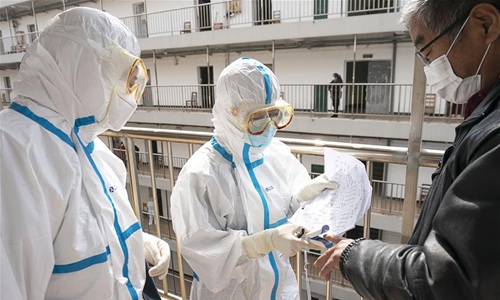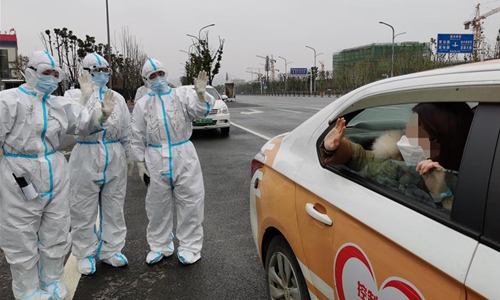Stigma and compassion: Hubei natives get mixed treatment amid eased quarantine
○ Many Hubei residents are seeking to go back to work and resume their lives outside the province
○ Some have encountered difficulties, misunderstandings and even discrimination in other regions
○ Favorable polices are now applied to ensure the interests of those from Hubei

People enjoy sunset on a plank road at the Donghu Lake in Wuhan, capital of central China's Hubei Province, March 18, 2020. No new infections of the novel coronavirus were reported on Wednesday in Wuhan, the epicenter of the epidemic, marking a notable first in the city's months-long battle with the microscopic foe. (Xinhua/Shen Bohan)
While the COVID-19 outbreak is winding down, residents from Central China's Hubei Province have found themselves facing difficulties, misunderstandings and even discrimination in returning to their work and lives in other cities.
Policies are being applied to ensure Hubei residents can reclaim their pre-outbreak routines as soon as possible.
Hubei Province has seen no new confirmed cases of COVID-19 in four days as of Saturday. The province has had 67,800 confirmed cases, with 3,144 dead. In its capital city Wuhan, the number of confirmed cases is 50,005.
Many Hubei cities have announced a removal of the lockdown, allowing people who had been stuck there, most of whom were home for Spring Festival, to go back to the cities where they work.
But many have found cities outside Hubei are not ready to welcome their return.
"Many places still forbid Hubei people from entering, and some companies have deducted their full-attendance bonus," a Hubei native, who asked for anonymity, told the Global Times on Friday.
Several coaches from Hubei entering Shanghai were barred at the toll gates near Shanghai and some were told to go back to Hubei. Many Hubei people would have to stay overnight in the coaches, the National Business Daily reported Friday.
The coaches were organized and sent by Hubei county and city government departments.
"The Shanghai CDC is afraid that so many people could cause transmission," an employee at the traffic department in Daye county, Hubei, said, according to the report.
Hubei has 6 million people working outside the province. Various regions have sent out about 120,000 people through organized coaches. Another 1.5 million will be sent to industrial cities in Guangdong and Zhejiang provinces, according to the Hubei Daily on Thursday.

Photo:Xinhua
Calling for kindness
Even those who did not return to their hometowns during the epidemic have encountered misunderstandings for being from Hubei.
“A Beijing woman literally jumped away when I said that I am from Hubei,” one woman told the Global Times. Due to the outbreak, she chose to stay in her Beijing home during the Spring Festival holiday.
A 28-year-old man from Xiangyang, Hubei Province told the Global Times he flew to Shanghai from Japan on February 29 but could not return to Hubei due to the Hubei lockdown. However, in Shanghai he was turned away by several hotels, because his hukou, or household registration, is from Hubei.
Ying Yong, secretary of the Hubei Provincial Committee of the Communist Party of China (CPC), and Cao Guangjing, vice governor of Hubei, have asked people outside Hubei to be kind to Hubei natives.
“Hubei people are heroes. They have made great efforts and contributions in winning the virus prevention battle. I call on the whole country and society to be kind to Hubei people and Hubei products,” he said while bidding farewell to 600 Hubei people who were heading to South China’s Guangdong Province from the railway station in Jingzhou on Thursday.
Guangdong Province sent two special bullet trains on Thursday to escort workers from Hubei to Guangdong. Li Xi, Party chief of Guangdong Province welcomed workers from Hubei at the train station and required local governments take care of them, Hubei Daily reported
“We admire the great contribution Hubei people made in fighting against the COVID-19,” said Li Xi. “Taking good care of those working here is our obligatory responsibility,” he added.
Many netizens have expressed support for Hubei people.
“Hubei and Wuhan suffered so much for the whole country; we should not disappoint them,” a Sina Weibo user said.
“It’s not OK to reject Hubei people. Like most people they are healthy and have been staying at home for so long,” another said.

Photo taken with a mobile phone shows a cured patient waving goodbye to medical workers before leaving the Leishenshan hospital in Wuhan, central China's Hubei Province, Feb. 27, 2020. On Thursday, 32 coronavirus-infected patients recovered and were discharged from the hospital.Photo:Xinhua
Restarting life
To help Hubei people overcome these difficulties in other cities, governments and organizations at different levels and in different places in China have been applying favorable policies.
The China Communist Youth League on Thursday launched a project to support young people who have recovered from COVID-19, according to the Xinhua News Agency.
In three months, applicants can receive basic income, employment information and training courses.
Many from Hubei have started their lives outside their hometowns again.
After arriving in Shaoxing, East China’s Zhejiang Province on Wednesday by a chartered train arranged by the Shaoxing government, Wang Xifu started his first work day on Friday since being stranded in Hubei during Spring Festival due to the COVID-19 pandemic.
Wang is a 43-year-old skilled welder who has been working at Shengzhou Special Sprocket Co in Zhejiang for 14 years. He can earn around 10,000 yuan ($1,416) a month and sends half of the money back to his family in Hubei.
Wang thanked the local governments and his company’s efforts to let him resume work. “They treated us really well,” Wang told the Global Times on Friday, noting that he couldn’t do anything else to repay society but focusing on his own job. “I didn’t feel any discrimination from the local government or my company.”
Wang and other four employees returning from Hubei are all living in the company dormitories. On the first work day, a few colleagues kept their distance when talking to him, he recalled. “I totally understand as the pandemic is still dangerous,” Wang noted.
Wei Qingbin, 38, also came back from Hubei by the same chartered train as Wang. Wei has been stranded in Hubei since Spring Festival. “I was anxious that I couldn’t come back to work. I need to take care of my parents and child,” Wei told the Global Times on Friday.
As a skilled employee, he has been working in Shaoxing for 15 years. “I felt good on the first work day,” Wei said.
A Hubei woman living in Shanghai for 18 years said she was very grateful that the Shanghai medical team went to the frontline in Hubei to help fight against the coronavirus.
Her nephew had just returned from Hubei to Shanghai several days ago, and now is undergoing quarantine at the designated place arranged by the Shanghai local government. “Everything in the designated place is well arranged,” the woman said, adding that she appreciated the government’s efforts to let people from Hubei get back to normal life.
Newspaper headline: Back to normal